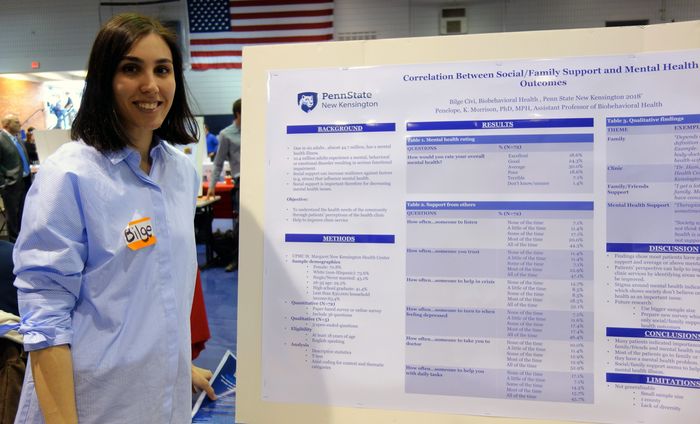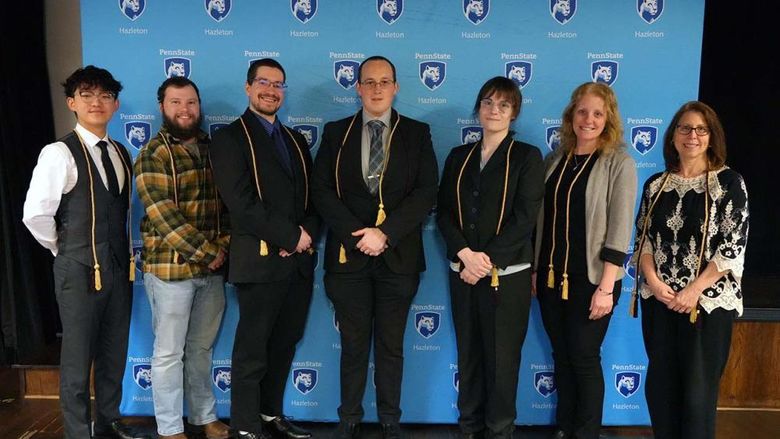Biobehavioral health students Marcella Moore, left, and Bilge Civi prepare a survey as part of their biobehavioral course work to be delivered to University of Pittsburgh Medical Center St. Margarets' New Kensington Family Health Center. Moore and Civi arrived at New Kensington by way of articulation agreements that allowed them to transfer associate degree credits from their respective community colleges and apply them towards a four-year bachelor's degree program at a Penn State Commonwealth Campus.
UNIVERSITY PARK, Pa. — For some Pennsylvania students who want to earn a bachelor’s degree, starting off at a four-year institution like Penn State might not be an option.
Instead, they begin their academic careers at one of the state’s many community colleges. But thanks to what’s known as an articulation agreement, those students have the opportunity to transfer credits earned at a community college and apply them toward a baccalaureate degree at Penn State.
“The overarching goal is to provide access to Penn State throughout the Commonwealth for students who begin their studies at community colleges,” said Penny Carlson, assistant vice president and executive director of academic services for the Commonwealth Campuses, of the articulation agreements. Essentially, the agreements are a pact between Penn State and the community colleges that gives students the chance to build on their two-year associate degree and earn a four-year bachelor’s degree at the University.
LEARN MORE: To learn more about the path from community college to Penn State, visit https://priorlearning.psu.edu/earn-credit/transfer
One of those benefitting from such agreement is Marcella Moore, a returning adult student who is an ordained minister and is working toward a degree in biobehavioral health at Penn State New Kensington.
As a high school student in the early 1970s, Moore said the expectations for women graduating from school were different than they are today.
“You were going to go to work right out of high school,” the 64-year-old mother and grandmother recalls. “I took bookkeeping. You were either going to be a school teacher or a nurse.”
Moore focused on business-related courses — typing, shorthand, accounting — but the classes weren’t designed for women to lead. “We were going to be in an assisting mode to somebody else, as a receptionist or a secretary.”
She went to work and raised a family, but never let go of her ultimate dream. “I had a desire to go to college.”
Eventually, Moore began taking courses at Westmoreland County Community College (WCCC). There, a faculty member told her about a program that allowed WCCC students who complete an associate degree to transfer to Penn State to work on a bachelor’s degree.
She chose biobehavioral health to complement her work as a minister in offering healing and deliverance.
“You see a lot of young people with diabetes and illnesses that we hadn’t seen before,” Moore said. “What is going on with them? Are they using food as a comfort or a pacifier? What’s really going on with you that you’re doing these things to your health?”
Adding access
Penn State signed its first articulation agreement with Harrisburg Area Community College in November 1995. Carlson said that in the time since, the University has inked agreements with 12 of the 14 community colleges in Pennsylvania and the private Lakawanna College in Scranton.
She said the agreements are a partnership between Penn State and a local community college, not a competition to recruit students away.
“We want students to successfully finish their associate degrees at the community college. We provide them the opportunity to transfer to Penn State to complete a baccalaureate degree,” Carlson said. In many instances, students attending community colleges are adult learners who are local and are working professionals. Articulation agreements give those students access to baccalaureate degrees through the University.
LEARN MORE: See the complete list of Pennsylvania community colleges that Penn State has articulation agreements with: https://priorlearning.psu.edu/transfer-agreements-pennsylvania-community-colleges
She said for the 2016-17 academic year, 43 percent of community college transfer students were adult learners.
Since 2004, more than 12,000 community college students have transferred to a Penn State location to pursue a bachelor’s degree.
Bilge Civi first came to Pittsburgh from her native Turkey to learn English. “Originally, I was going to come here for six months and then head back to Turkey.”
But while studying at the Community College of Allegheny County, she heard a presentation about transferring credits to Penn State.
“I was ready for a new challenge,” the 25-year-old said. “I loved this idea and contacted Penn State New Kensington.”
Civi also enrolled in the biobehavioral health program and focused her studies on domestic violence. As part of her work, Civi has collected data around the campus area and has presented her research in various arenas.
She said her experience at Penn State helped to change her plans. Civi married a New Kensington information sciences and technology graduate and is looking to enroll in graduate school, with the goal of becoming a university professor.
Andrea Adolph, director of academic affairs at Penn State New Kensington, said articulation agreements are designed to provide students like Civi a smooth transition from community college to Penn State.
“The articulation agreement maps it out for a student,” she explained. “It also gives them incentive to complete the associate degree.”
When Penn State begins negotiating an articulation agreement with a community college, the University examines the syllabi from the community college to see what classes and programs match well with those offered at Penn State. The goal is to allow students to seamlessly transfer credits from their two-year associate degree in pursuit of their four-year bachelor’s degree.
Adolph said many community college students enroll knowing that they’ll transfer those credits to another institution.
Carlson said, “We don’t want them to lose credits in the transfer process — that’s the goal.”
Building the local workforce
As Penn State considers an articulation agreement, Adolph said the University looks at the economic demands of the surrounding community. For example, New Kensington’s articulation agreements include the campus’ project and supply chain management program as well as its biobehavioral health degree program, two fields that have seen growth in demand in the Alle-Kiski Valley, where Penn State New Kensington is located.
Across the state this past February, Luzerne County Community College (LCCC) signed an agreement with the University that encourages students who complete an associate degree from LCCC to transfer into bachelor’s programs at five Penn State campuses located in the region — Hazleton, Lehigh Valley, Schuylkill, Wilkes-Barre or Worthington Scranton.
An agreement announced in January 2017 permits students from Northampton Community College to transfer into 11 baccalaureate degree programs at 14 Penn State locations.
“You can think regionally about what we can offer to students,” said Elizabeth Wright, director of academic affairs at Penn State Hazleton. She said at the Hazleton campus alone, community college transfer students can select from 10 bachelor’s degree programs, including project and supply chain management, engineering, science, information sciences and technology, administration of justice, psychology, business administration, English and corporate communication.
Wright said one of the most popular programs at Hazleton is general engineering, which focuses on alternative energy.
Cassandra Kelly transferred from LCCC and is majoring in engineering. “I always wanted to do something with alternative energy, and I always wanted to go to Penn State because it’s great at engineering,” she said.
But for financial reasons, Kelly started her academic career at LCCC. “At the time, I didn’t have a lot of money and had to support myself,” she recalled.
Kelly said she has no regrets about starting at LCCC.
“For some reason, community colleges have a stigma — they’re just as hard and as good. You have to take them seriously,” she said, adding that going to a community college first really allowed her to save money.
Getting to Penn State
Like all other prospective students, individuals who wish to transfer from a community college to a Penn State campus must submit transcripts and meet the University’s admissions requirements.
But Carlson said application fees are typically waived for community college transfers to Commonwealth Campuses under the articulation agreements. And academic advisers work with students to confirm that credits earned during their community college time are incorporated as part of the student’s overall academic plan.
Kelly, who hopes to use her engineering degree to work on wind turbines in the Wilkes-Barre area, said she’s already met with her program coordinator to plan her next two years at Penn State Hazleton. “It all fell into place,” she said.
At the end of the day, Adolph said the articulation agreements are about creating additional opportunity for students around Pennsylvania. “We want them to think of Penn State’s Commonwealth Campuses when they’re done with community college and are ready to transfer.”
To learn more about the degree programs offered at Penn State’s Commonwealth Campuses, visit https://admissions.psu.edu/pennstate/.




